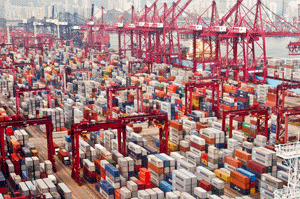
Minister of Trade Tim Groser says China's growing dominance as an export market doesn't risk New Zealand repeating the pain experienced after Britain joined the then European Economic Community in 1973. This is because NZ no longer has the rigid economic policies in place it had then, and because there are now more global trade opportunities than NZ could ever exploit.
In a speech to the NZ China Centre at Victoria University, Groser said the best insurance policy to China dependence that NZ can take out is to complete the Trans Pacific Partnership (TPP) negotiations, boosting access to markets representing about 40% of global Gross Domestic Product (GDP).
Groser noted NZ's internationally recognised success in trading with China, through which annual two way trade topped $20 billion in the May year. Annual exports rose 53% to $11.6 billion and imports increased 9% to $8.5 billion. He said this success was leading to people asking whether NZ's in danger of creating too much trade dependency on China.
"Personally, I think it would be harsh to brush this aside by saying some people can only ever look at a glass as half-empty. It is a fair question that deserves a fair answer. It is especially so in the light of the defining event of our trading economy in the last 50 years: The body-blow we suffered when the UK, which then absorbed 50% of our total exports, entered the then EEC, triggering a whole series of difficult adjustments by NZ. As a country, we know the hard way about trade dependency and the risks it involves," said Groser.
"However, as I go through my analysis of the issue, just bear in mind one central fact. The world is utterly different today than it was in the 1970s. The front and centre of the problem faced forty years ago by New Zealand trade negotiators like me, and particularly the people I learned my craft from, was we had too much product for export and too few market opportunities open to us. The world just shut us out."
Today’s trade policy 'problem' - if indeed 'problem' is the right word for it - is the opposite: We have more opportunities than we could ever exploit. In terms of our agri-business exports, we can only feed around 40-50 million people. The new trade agenda in front of us – and TPP is the biggest game in town here – is about risk diversification and giving our companies more choice still," Groser said.
"The biggest single risk-minimisation strategy New Zealand can follow is to ensure that our exporters, whether they are exporting high technology medical equipment or infant formula, have access to other markets. That, ladies and gentlemen, is what our pro-active trade negotiation and trade promotion agenda is all about."
Although, as always, the trade negotiation agenda is "agonisingly difficult" to bring to a close, "absolutely the best insurance policy New Zealand can take out is to complete the TPP negotiations and improve our access to the huge markets that would represent, about 40% of global GDP," said Groser.
In terms of the lessons from 1973 Groser said the real problem wasn't so much export dependency on Britain, which was about three times as high as the relative share of NZ exports to China today. Rather it was the lack of alternative markets, and rigid domestic economic policies designed to protect everything, that actually ended up protecting nobody.
"Ladies and gentlemen, we are in a far, far better space today. We should be celebrating, not fretting about, our economic linkages with China," said Groser.
He also pointed out there are 124 countries that now count China as their number one trading partner, but said he was optimistic a range of "mini-China" stories will play out for NZ through "the extraordinary growth story" in emerging economies like Indonesia, Brazil, Mexico, Turkey, the Gulf States, the Philippines and India.
3 Comments
TPP -- NZ's sovereignty and a little bit more diversed mixture of export markets (but still very very interlinked) are here for NZers to choose.
Which one do you prefer?
1 or 2?
Do we actually need more markets for our goods? Are they sitting in warehouses/ on wharves or going rotten in the fields? Our environment cannot sustain the dairy track we are on. MOT's freight study predicts 40% more freight movement until 2040 - continuing the trends that have got us to our currently steadily degrading environment.
Grosser's speach is treading awfully close to the threshold of propaganda, and interest.co not much better for publishing it.

We welcome your comments below. If you are not already registered, please register to comment
Remember we welcome robust, respectful and insightful debate. We don't welcome abusive or defamatory comments and will de-register those repeatedly making such comments. Our current comment policy is here.